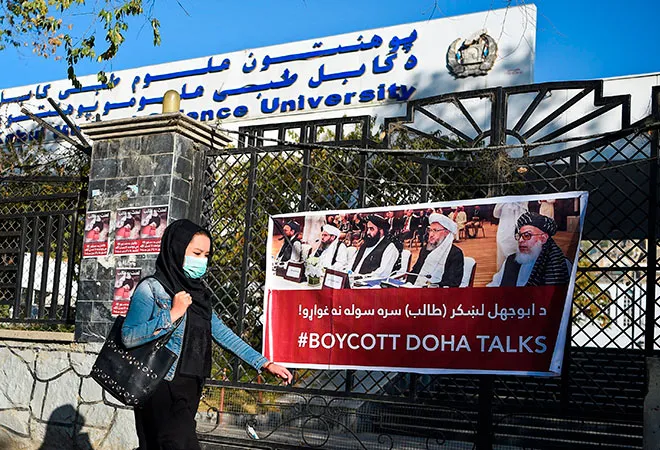
It has been over a month and a half since the historic intra-Afghan negotiations began in Doha, Qatar, on 12 September. While the beginning of the talks was widely applauded as a step in the right direction, the simultaneous rise in violence in Afghanistan alarmed observers the world over. Ramped up violence in the face of ongoing “peace talks” was proof of the fact that the Taliban intended to leverage violence as tool to maintain their upper hand in negotiations, while staying preponderant on the battlefield. Despite the fact that the talks were a key outcome of the United States’ agreements with the Taliban and the government of the Islamic Republic of Afghanistan, the underwhelming trajectory of the peace process has raised serious concerns about the future of peace and stability in Afghanistan.
The talks, which began after six months of back and forth between the warring sides on the contentious issue of prisoner release, have witnessed little progress so far. The Taliban seems to be negotiating in bad faith, constantly shifting the goal post to delay progress in talks until the outcome of the US presidential election is known.
While the beginning of the talks was widely applauded as a step in the right direction, the simultaneous rise in violence in Afghanistan alarmed observers the world over.
The group has demanded the release of their remaining prisoners in government captivity, as was reportedly conveyed to the US Special Envoy Zalmay Khalilzad at his meeting with senior Taliban leadership on 28 October, in Doha. The biggest roadblock to progress in talks, however, is the fact that the delegations of the Taliban and the Afghan government have failed to agree on a joint agenda and resolve even the most basic procedural issues — a deadlock that has held back the talks from moving onto the more substantive matters up for debate.
Issue of jurisprudence
The two sides have remained at loggerheads on the issue of jurisprudence. The Taliban have demanded for the Hanafi school of Islamic jurisprudence to be the guiding principle in all decision making about the country’s future, especially in case of disagreements over religious texts. The Afghan government has so far refused to accept this demand, citing concerns regarding the rights of minorities communities such as the Hazaras, who are predominantly Shia Muslims and thus, function in accordance with the Jafari school of thought. The government is also mindful of the possibility of being subjected to a limited space for manoeuvre in negotiations, once the Hanafi framework is established, forcing them to accept the Taliban’s diktat on issues such as women’s rights, the role of civil society, et cetera.
The government is mindful of the possibility of being subjected to a limited space for manoeuvre in negotiations, once the Hanafi framework is established.
At the moment, the Hanafi school of thought is accepted as the law of the land, which Article 130 of the Afghan Constitution provides for. However, it functions only in a supplementary capacity to the provisions and legal procedures laid down in the Constitution. Making Hanafi jurisprudence the bedrock of all socio-political activity in Afghanistan, would not only ruffle the feathers of those Afghans that follow other Islamic schools of thought, but may even threaten to relegate them to the status of second class citizens. It is imperative for the Afghan government therefore, to oppose the Taliban’s exclusionary demand and ensure that constitutional inclusivity is safeguarded at all costs.
Basis for deal
The other issue that has emerged as a major sticking point is the Taliban’s unwavering demand to make the US-Taliban agreement of 29 February 2020, the basis for intra-Afghan talks. Senior members of the Taliban have often alluded to the fact that till the US-Taliban agreement is referenced as the basis for ongoing negotiations, progress in talks would remain elusive. The Afghan government did not seem as averse to the demand as they were in the matter of jurisprudence.
The US-Taliban deal is itself limiting for the Afghan government, insofar as it does not force compliance on the Taliban, on any of the issues that the Afghan government has deemed as crucial.
However, their quid pro quo proposition to have the US-Taliban Agreement and the US-Afghanistan Joint Declaration to be accepted as the basis for talks was refused by the Taliban. As a result, the Afghan government revised its accommodative stand, and argued that since it wasn’t party to the US-Taliban Agreement, the provisions of the agreement would not apply to the Afghan people.
Interestingly, the US-Taliban deal is itself limiting for the Afghan government, insofar as it does not force compliance on the Taliban, on any of the issues that the Afghan government has deemed as crucial. Instead of making comprehensive ceasefire a non-negotiable for the Taliban, by incorporating it as an integral component of the US-Taliban deal, the condition was simply made an agenda point of intra-Afghan talks that were to take place in future.
As a result, the Taliban has been able to increase the frequency and severity of its attacks that has caused casualties among civilians and Afghan forces alike, without worrying that it would undermine their strengthened position in negotiations. Reports also suggest that the group has refused to sever ties with the Al Qaeda, in effect, indicating that it could care less about honoring the US-Taliban agreement.
This essay originally appeared in ORF South Asia Weekly.
The views expressed above belong to the author(s). ORF research and analyses now available on Telegram! Click here to access our curated content — blogs, longforms and interviews.




 PREV
PREV


